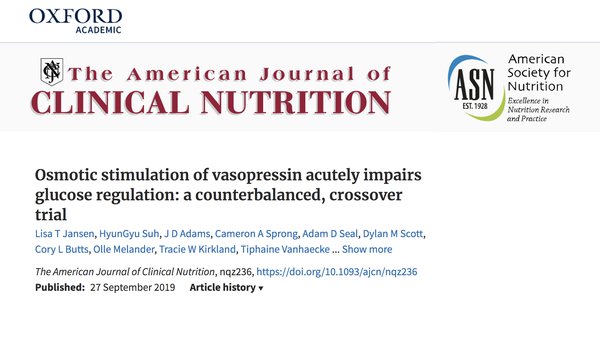Jansen et al. 2019
Osmotic stimulation of vasopressin acutely impairs glucose regulation: a counterbalanced, crossover trial
Abstract
Background
Epidemiological studies in humans show increased concentrations of copeptin, a surrogate marker of arginine vasopressin (AVP), to be associated with increased risk for type 2 diabetes.
Objectives
To examine the acute and independent effect of osmotically stimulated AVP, measured via the surrogate marker copeptin, on glucose regulation in healthy adults.
Methods
Sixty subjects (30 females) participated in this crossover design study. On 2 trial days, separated by ≥7 d (males) or 1 menstrual cycle (females), subjects were infused for 120 min with either 0.9% NaCl [isotonic (ISO)] or 3.0% NaCl [hypertonic (HYPER)]. Postinfusion, a 240-min oral-glucose-tolerance test (OGTT; 75 g) was administered.
Results
During HYPER, plasma osmolality and copeptin increased (P < 0.05) and remained elevated during the entire 6-h protocol, whereas renin-angiotensin-aldosterone system hormones were within the lower normal physiological range at the beginning of the protocol and declined following infusion. Fasting plasma glucose did not differ between trials (P > 0.05) at baseline and during the 120 min of infusion. During the OGTT the incremental AUC for glucose from postinfusion baseline (positive integer) was greater during HYPER (401.5±190.5 mmol/L·min) compared with the ISO trial (354.0 ± 205.8 mmol/L·min; P < 0.05). The positive integer of the AUC for insulin during OGTT did not differ between trials (HYPER 55,850±36,488 pmol/L·min compared with ISO 57,205± 31,119 pmol/L·min). Baseline values of serum glucagon were not different between the 2 trials; however, the AUC of glucagon during the OGTT was also significantly greater in HYPER (19,303 ± 3939 ng/L·min) compared with the ISO trial (18,600 ± 3755 ng/L·min; P < 0.05).
Conclusion
The present data indicate that acute osmotic stimulation of copeptin induced greater hyperglycemic responses during the oral glucose challenge, possibly due to greater glucagon concentrations.
This study was registered at clinicaltrials.gov as NCT02761434. Am J Clin Nutr 2019;00:1–9.
